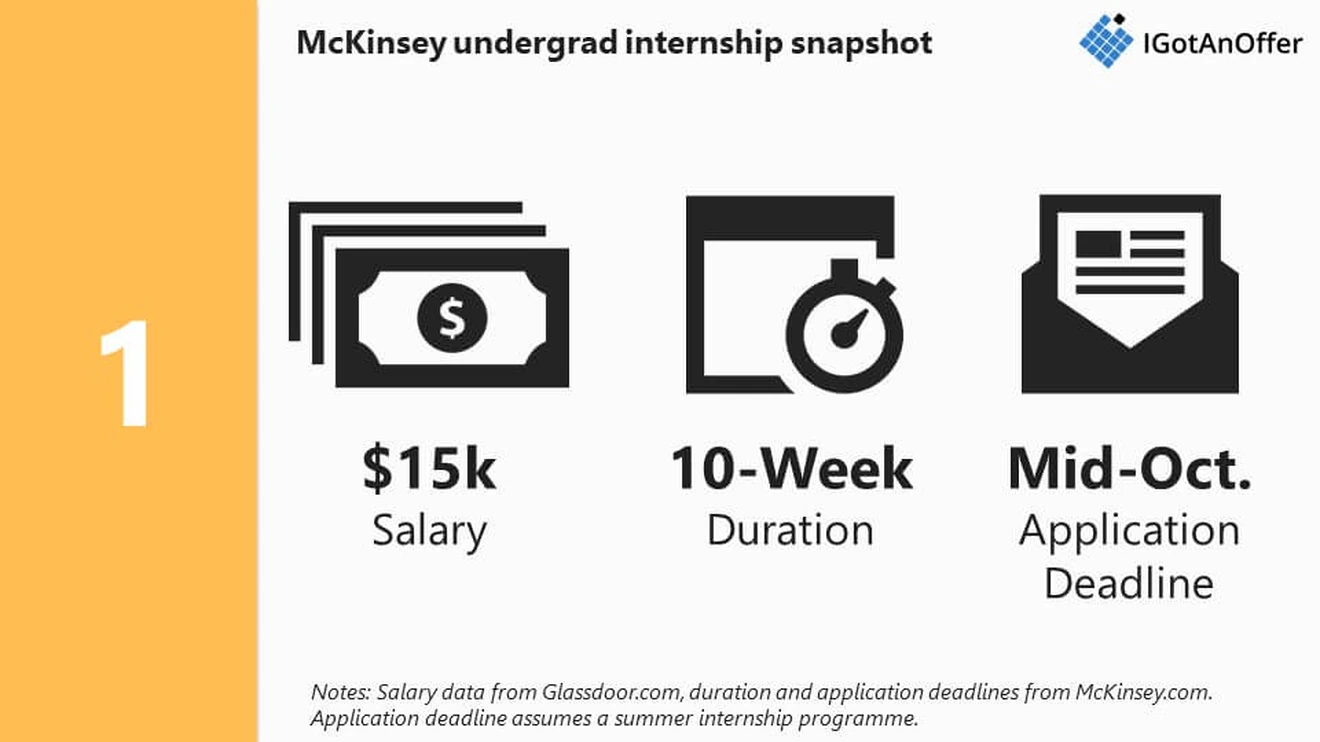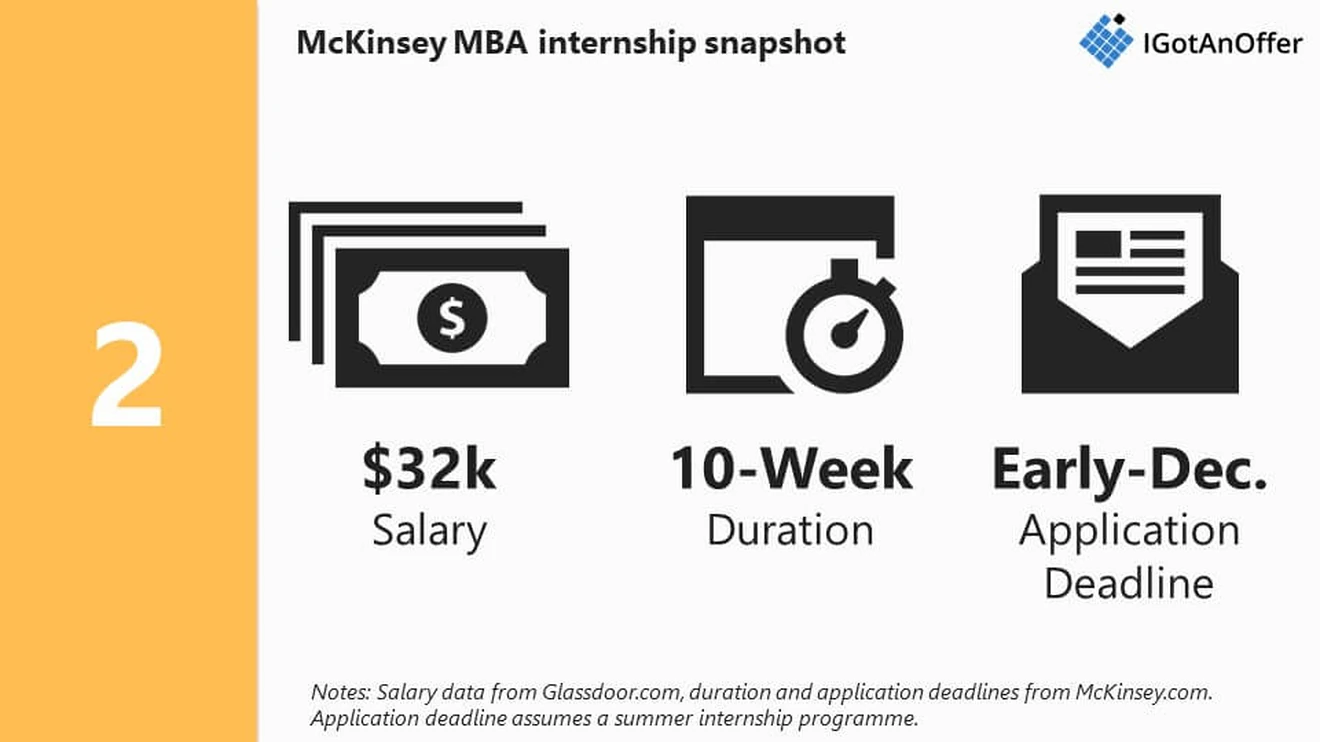McKinsey internships can be broadly categorised into two types: undergraduate internships, and MBA internships. It makes sense for McKinsey to group their internships in this way because the roles that McKinsey is recruiting for will be different at each level.
Let's begin with an overview of the internship roles available at the undergraduate level, then we'll shift to an overview of McKinsey's MBA internships. We'll also present an overview of the interview process for McKinsey internships, along with a few useful tips to help you get an offer. Let's jump in!
Click here to practise 1-to-1 with McKinsey ex-interviewers
1. McKinsey undergraduate internships ↑
1.1 McKinsey internship salary and deadline (undergrad)
As you might expect, the specific details for a McKinsey internship can vary based on a number of factors. For example, your office location and McKinsey practice (e.g. McKinsey Digital, Analytics, etc.) can all impact the compensation and programme that McKinsey offers you.
However, there are some typical ranges that will give you a pretty good idea of what you can expect.

For an undergrad Business Analyst internship, McKinsey tends to pay around $6k/month, according to data from Glassdoor. And the duration of a McKinsey internship tends to be around 10 weeks long, which is usually (but not always) during the summer.
To summarise, you can expect to earn about $15k in total, during a 10-week undergrad-level internship with McKinsey & Company. This is an extremely competitive rate, which is about even with the other members of the Big 3 consulting firms. It's also interesting to note that McKinsey's intern salary is just slightly behind the famously high salary of Google's interns, who would make over $18k during a 10-week internship.
If that's already enough to get you excited about a McKinsey internship, then you may also like to know the application deadline. At the undergrad level, applications for summer internship positions typically close in mid-October. There may be some exceptions to this, but generally, if you want to get into a McKinsey summer internship, you're going to need to submit your application by the second or third week of October.
Now that you have an idea of the income and timeline, let's dive into further details on McKinsey's internship programme for undergraduates.
1.2 The Business Analyst Internship (undergrad)
At the undergraduate level, McKinsey's primary internship programme is the Business Analyst Intern role. If you're familiar with McKinsey's career path, this will make sense because when McKinsey hires undergraduates into full-time consulting positions, they generally start in a role called Business Analyst. So, for their interns, McKinsey is basically just adding "Intern" at the end of their normal entry-level title for undergraduates.
There are a lot of similarities between the Business Analyst internship, and the full-time Business Analyst position, particularly when it comes to the way work and project teams are structured. But, to give you an idea of the work you'll encounter, let's look at an example of the type of consulting project you might be involved with as a Business Analyst Intern at McKinsey:
A financial services firm like Wells Fargo might hire McKinsey to provide recommendations on whether they should expand their retail banking business into the UK market. McKinsey would send a Consulting team, who would gather information on Wells Fargo's retail banking business, and the retail banking market in the UK. Then, they would conduct an analysis, and test hypotheses to evaluate different potential strategies for expansion. Finally, the McKinsey team would provide a recommendation to the client.
As a Business Analyst Intern, you would likely be the most junior member of the consulting team you work with. However, McKinsey gets their people involved fast, and interns are no exception. You'll be given ownership of a specific piece of project work to deliver, and you can expect to have significant responsibility and client interactions. Some examples of day-to-day activities include developing client presentations, analysing and organising large data sets, collaborating with your McKinsey colleagues, and even leading client workshops.
The Business Analyst internship also provides an introductory training programme and multiple social events. And, in addition to coaching from your normal project team, interns are paired with a McKinsey Partner from their host office who will help them navigate the internship. This experience provides incredible opportunities to network within the firm. If you want to go full-time after your internship, you would already have a great set of connections that can help you find the type of project you're most interested in joining.
As an additional note, if you are targeting a specific practice (e.g. McKinsey Digital, Analytics, etc.) or industry (e.g. Financial Services, Retail, etc.), then you'll be able to indicate that in your application. You can find a direct link to the Business Analyst Intern application page below. We've also compiled an overview of the most important qualifications you'll need to qualify for McKinsey's Business Analyst internship.
Key qualifications:
- Be in your junior year of an undergraduate programme (or second to last year of a non-business masters degree)
- Strong academic credentials including a competitive GPA (3.5+/4.0)
- Exceptional analytical skills and passion for the consulting field
- Track record of proactive leadership in your past work experiences or extracurricular activities
- Excellent communication skills, and an ability to work well with teams
Note: The qualifications above reflect some of the typical qualifications McKinsey looks for in their Business Analyst Internship applicants, and the above list was informed by their publicly posted job listing which you can find at the below link.
McKinsey Business Analyst Intern job listing
1.3 Other internships (undergrad)
In addition to the Business Analyst internship, there are a few other McKinsey internships that you may be eligible for as an undergrad. The majority of these other opportunities, come from one of the 3 programmes below:
- Freshmen or Sophomore Diversity Leaders Internship (USA/CA)
- Fellow Internship (Europe and Brazil)
- Local office internships
Let's briefly cover each of these 3 other types of McKinsey internships.
First, McKinsey has a Diversity Leaders Internship programme in the USA and Canada, which is open to students who identify with one of several minorities. This programme is available to undergraduates during the summer after their Freshmen or Sophomore year, which is before they would be eligible for the Business Analyst Internship. In fact, candidates who perform well in the Sophomore Diversity Leadership Internship could receive an offer to return to McKinsey for the following summer as a Business Analyst Intern.
Second, the Fellow Internship is a programme which is available in some McKinsey offices in Europe and Brazil. It's similar to the Business Analyst Internship in many ways, but it does not seem to have the same requirement that candidates be in their junior (or second to last) year of their undergraduate or non-business masters degree.
Third, and finally, McKinsey offers what we will call "local office" internships. And these represent a wide variety of internship roles, that fall outside of the other programmes mentioned above. These are generally hosted by a single (or a few) McKinsey offices. You can find these opportunities by networking with consultants and managers. Sometimes you can also find this type of opportunity posted on McKinsey's job board. As of the writing of this article, there were over 25 local office internships at McKinsey, spread out around the world.
1.4 Target schools (undergrad)
It's also important to note, that McKinsey pursues candidates from a group of several select target schools. If you are attending one of these universities, then you'll be able to learn about the specific opportunities that are currently available to you, straight from the McKinsey recruiters.
The opportunities available at your specific school could be different than those described above, so it's helpful to go into information sessions or career fair events with an open mind.
Below you'll find a list of leading undergraduate target schools based on survey data from current McKinsey employees. The data for this list originally comes from this article by Poets & Quants. Note that internships may not be available at every school on this list, and things shift over time, but these are known to be among McKinsey's biggest sources for undergraduate talent.
Top US undergraduate programmes for Mckinsey careers:
If you don't see your school on this list, then it probably will be more challenging to land an internship interview with McKinsey. However, it is not impossible, and one of the best ways to get your foot in the door is through networking. So if you really want to go for a McKinsey internship, take intentional steps to connect with people in consulting. Take it one step at a time, and don't give up!
In the next section, we'll turn our attention to the details of McKinsey's MBA internships.
2. McKinsey MBA internships ↑
2.1 McKinsey internship salary and deadline (MBA)
Similar to undergrad internships, the salary and timelines for McKinsey's MBA internships can vary based on a number of factors, such as office location and your functional expertise and experience.
Fortunately, there are typical ranges that provide a pretty good idea of what you can expect.

For an MBA Associate internship, McKinsey tends to pay around $13k/month, according to data from Glassdoor. And the duration of McKinsey's MBA internships is usually around 10 weeks during the summer.
To summarise, you can expect to earn about $32k in total, during a 10-week MBA-level internship with McKinsey & Company. This is an impressive rate, which is neck-and-neck with the compensation offered at BCG and Bain. That means that, in just 10 weeks, McKinsey MBA interns earn nearly 70% of the average annual salary of Americans (across industries).
MBA candidates also have a bit more time to apply compared to undergraduate candidates. At the MBA level, applications for summer internship positions typically close at the beginning of December (for US-based schools). So, you'll need to submit your application in the first couple days of December, if you want a chance at a McKinsey summer internship.
Now that you have an idea of the income and timelines, let's examine some more details on McKinsey's Associate Internship.
2.2 The Associate Internship (MBA)
At the MBA level, McKinsey's primary internship programme is the Associate Intern role. Similar to the Business Analyst internship, the Associate internship is named after a normal full-time title at McKinsey. If you're not familiar with where the Associate role falls on McKinsey's career path, check out this article for a helpful overview.
The type of projects and team structure you'll encounter as an Associate intern is also very similar to what you'd encounter as a full-time Associate at McKinsey. As an exercise, let's take a look at a high-level example of the type of project you could encounter at McKinsey.
A retail firm like Wal-Mart might hire McKinsey to provide recommendations on how they should improve their website sales to better compete with Amazon.com and other e-commerce retailers. McKinsey would send a consulting team, who would gather information on Wal-Mart's current online presence. Then, they would conduct an analysis, and test hypotheses to evaluate different potential strategies. Finally, the McKinsey team would recommend the next steps Wal-Mart should take.
As an Associate Intern, you would likely be one of the most junior members of the consulting team you work with, but be ready for significant responsibility from day one. During your internship, you can expect to join a team of three or more consultants and you'll be fully involved in the team's analysis, testing, communication with clients, and potentially the implementation of solutions.
In addition to the normal project work, Associate Interns receive structured training from McKinsey during the first few weeks of the programme. Interns are also paired with a McKinsey Partner from their host office for support and guidance. These connections are an excellent way to evaluate your fit with McKinsey and the different types of roles that are available within the firm, not to mention they are exceptional networking opportunities.
If you already know a specific practice (e.g. Implementation, Analytics, etc.) or office (e.g. Chicago, Houston, etc.) you want to join at McKinsey, then you'll be able to indicate that in your application. If you are connected with a McKinsey recruiter, this is also a good thing to discuss with them. Alternatively, you may be able to get in touch directly with the office you want to work at.
Below, you'll find a direct link to the Associate Intern application page. We've also compiled a brief overview of the most important qualifications you'll need in order to get into McKinsey's Associate internship.
Key qualifications:
- Be actively enrolled in a graduate degree programme like an MBA or PHD
- Excellent academic credentials including a competitive GPA (3.5+/4.0)
- Highly driven, with proven leadership skills demonstrated by past projects
- Strong problem-solving skills and familiarity with the consulting industry
- Exceptional communication skills and ability to work well in teams
Note: The qualifications above reflect some of the typical qualifications McKinsey looks for in their Associate Internship applicants, and the above list was informed by their publicly posted job listing which you can find at the below link.
McKinsey Associate Intern job listing
2.3 Other internships (MBA)
There are not as many other types of MBA-level internships at McKinsey, like there are at the undergrad-level. The Associate Internship is the primary opportunity, but there may also be what we call "local office" internships available.
Local office internships are typically hosted by one McKinsey office (or just a few), and often have a particular focus aligned with the needs of a current project. The best ways to find these opportunities are by networking with current McKinsey employees. If any local office internships are posted on McKinsey's job board, you can also find them here.
2.4 Target schools (MBA)
Most of the MBA candidates that get hired by McKinsey come from a small group of target schools. If you happen to be attending one of these target universities, then you may be able to get more information on McKinsey's internship opportunities straight from the firm's recruiters.
Below you'll find a list that ranks the top MBA programmes for getting a job at McKinsey, based on recruitment data from this article. As a note, recruitment often goes in cycles and things shift over time, so when you read this article there may or may not be internships currently available.
With that said, this list should provide a good sample of the schools where McKinsey tends to recruit graduate students.
There are some big-name programmes on this list, and if you don't see your school above, it probably will be more challenging for you to land an internship interview with McKinsey.
However, driven people overcome the odds all the time. So, if you really want to work at McKinsey, make a plan and don't give up! There are other ways to get your foot in the door, including networking and by submitting an excellent application through McKinsey's online job board.
In the next section, we'll dig deeper into the application process you'll need to prepare for in order to land a McKinsey internship.
3. McKinsey internship interview process ↑
For their internships, McKinsey typically uses an interview process that is similar to their process for full-time roles. There is some variation based on the position you are applying for, the office location, and your school. But, in most cases the firm uses four filters to select candidates:
- Resume and cover letter screening
- McKinsey Problem Solving Game
- First round of interviews
- Second round of interviews
Competition for McKinsey internships is fierce. So, in order to get an offer, you'll need to pass each of these stages and set yourself apart from other candidates. Next, we'll briefly summarise each of these four evaluations that McKinsey uses, to help you get started with your preparation.
The McKinsey Problem Solving Game is a standardised maths and logic test. The questions in the game are meant to test candidates on skills that are relevant in the day-to-day work at McKinsey. These questions are somewhat similar to GMAT questions, but they tend to be a bit different and more difficult. This video from McKinsey provides additional details to help you prepare.
Your next step will be to crack McKinsey's interviews. Your interviews at McKinsey will usually consist of two sections. The first section consists of PEI and fit questions, and the second section will be a case interview.
In a McKinsey case interview, you will be presented with a case study about a company facing an issue, and you'll be expected to analyse the situation and develop a recommendation. For example, you might get a case about a convenience store with declining profits, and you'll need to take steps to create a recommended solution. To get a better idea of what case interviews at McKinsey are like, check out the video below:
After getting some practice on your own, you should find someone who can do a mock interview with you.
3.1 Practise with peers
If you have friends or peers who can do mock interviews with you, that's an option worth trying. It’s free, but be warned, you may come up against the following problems:
- It’s hard to know if the feedback you get is accurate
- They’re unlikely to have insider knowledge of interviews at your target company
- On peer platforms, people often waste your time by not showing up
For those reasons, many candidates skip peer mock interviews and go straight to mock interviews with an expert.
3.2 Practise with experienced MBB interviewers
In our experience, practising real interviews with experts who can give you company-specific feedback makes a huge difference.
Find a McKinsey interview coach so you can:
- Test yourself under real interview conditions
- Get accurate feedback from a real expert
- Build your confidence
- Get company-specific insights
- Learn how to tell the right stories, better.
- Save time by focusing your preparation
Landing a job at a top consulting company often results in a $50,000 per year or more increase in total compensation. In our experience, three or four coaching sessions worth ~$500 will make a significant difference in your ability to land the job. That’s an ROI of 100x!
Click here to book McKinsey mock interviews with experienced McKinsey interviewers















